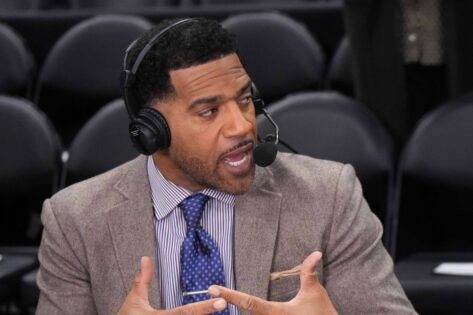While talking on Forbes, when asked whether he felt the effects of ongoing tariff tensions, former NBA player and current business leader Jim Jackson didn’t focus on his personal portfolio—he chose to speak more broadly. “How’s it going to trickle down to goods and services that we get? That’s the question,” Jackson said. “We don’t know yet, but you know when you impose a tariff on imports, does that hike up the price on what we’re going to be paying for that specific item?” When the reporter confirmed it would, Jackson replied plainly: “There go your answer. We are all going to be affected somehow.”
Pressed further about whether his ventures, particularly in real estate or construction materials, might be feeling the pinch, Jackson pointed to the bigger picture. “So we get affected by gas prices that go up because of transportation,” he explained. “Because now, to transport goods and services to a location costs you. So it drives up the cost of that delivery of that particular item, whether that’s goods, whether that’s steel, whether that’s glass, whatever it is, that all goes into the development cost.”
Jim Jackson isn’t alone in feeling the ripple effects—other NBA legends with major business ventures are navigating the same turbulent waters.
When trade policy hits the hardwood
The sneaker and apparel empires built by some of the NBA’s biggest legends are facing real pressure, thanks to former President Donald Trump’s newly proposed reciprocal tariff plan. Unveiled in April, the plan includes duties as high as 145% on imported consumer goods, including footwear. The Footwear Distributors & Retailers of America (FDRA), backed by 76 brands like Nike, Adidas, and Under Armour, immediately pushed back, warning of cash-flow crises and skyrocketing inventory costs. FDRA’s request was simple and direct: drop footwear from the newly announced tariff list.
Stephon Marbury knows this struggle intimately. His Starbury brand—built to offer stylish, affordable sneakers for low-income families—once sold “millions” before shutting down when Steve & Barry’s filed for bankruptcy in 2009. Marbury tried again in 2016, but the market was unforgiving. Now he’s preparing a 2025 re-launch, but tariffs remain a major concern. “In a world with tariffs… it’s hard, especially trying to sell product at a price point that’s affordable for people,” Marbury told Inc. Magazine. Speaking to Complex, he added, “I want to drop it next summer…,” but this timeline hinges partly on tariff negotiations between China and the United States.
For Michael Jordan, that appeal hits close to home. His Air Jordan line has brought in an estimated $1.5 billion in royalties since 1986. But with tariffs threatening to jack up costs, the Jordan Brand’s global reach and profit margins could take a hit. Shaquille O’Neal, who took over as President of Basketball Operations at Reebok in 2023 with plans to “take over the world,” may now face tougher odds amid rising import costs, even as rival brands like Nike feel the same squeeze. The same goes for Stephen Curry, whose Under Armour-backed Curry brand, launched in 2020, relies heavily on overseas manufacturing.
Dwyane Wade’s sneaker journey is also feeling the pressure. After departing from Jordan Brand, Wade signed a decade-long deal with Chinese sportswear giant Li-Ning in 2012, gaining equity and launching his signature Way of Wade line. But as tariffs on Chinese imports climb, the cost of bringing those products to U.S. consumers is expected to increase. Each of these athletes turned their on-court legacies into billion-dollar brands—now, all of them are at the mercy of global trade policy shifts.
What happens at the ports doesn’t stay at the ports. For players and even titans like Jordan and Shaq, or those like Jim Jackson, tariff hikes aren’t just macroeconomic talking points—they’re direct hits to business strategy, brand identity, and accessibility for everyday fans.
